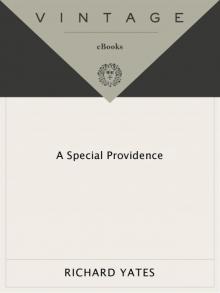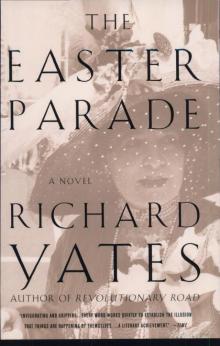- Home
- Richard Yates
Young Hearts Crying Page 12
Young Hearts Crying Read online
Page 12
He left the house, slamming the kitchen door, and made his way up past the extravagance of Ben Duane’s flower beds. But once he was at his desk he couldn’t lift a pencil or even see straight. He could only sit with half his fist in his mouth, breathing hard through his nose, trying to comprehend that the bottom had dropped out of everything. It was over.
He was thirty-five, and he was as frightened as a child at the thought of having to live alone.
Lucy wasn’t breathing very easily either as she finished her job at the sink. She hung the damp dish-towel firmly on its rack and the rack fell away from the wall, leaving four funny-looking little wounds in the cheap plaster. Nothing had ever worked in this makeshift kitchen; nothing had ever been right in the whole of this makeshift house or in the secondhand, second-rate piece of real estate around it.
“And I’ll tell you something else,” she whispered fiercely at the wall. “A poet is someone like Dylan Thomas. And a playwright – oh, God! – a playwright is someone like Tennessee Williams.”
For as long as she could remember, Laura Davenport had wanted a younger sister. Sometimes she felt she would have settled for a younger brother, if the choice were between that and nothing, but it was a sister that she wished for, and dreamed of. She had chosen a name for her long ago – Melissa – and she would often spend hours in whispered conversation with the phantom child.
“You ready for breakfast, Melissa?”
“Not yet. I can’t get this dumb comb through my hair.”
“Well, here, then; let me help. I’m good at snarls. This’ll only take a second. There. Is that better?”
“Oh, yes, it’s fine now. Thanks, Laura.”
“You’re welcome. Hey, Melissa? After breakfast, want to go over to the Smiths’? Or would you rather just fool around here with the dolls and stuff?”
“I don’t know; I can’t decide. I’ll tell you later, okay?”
“Okay. Or you know what else we could do, if you feel like it?”
“What?”
“We could go up to the picnic place and see if we can climb that big tree.”
“You mean the really big tree? Oh, no. I’d be scared, Laura.”
“How come? You know I’d be right there to hold you if you started to slip or anything. Why do you keep getting scared all the time, anyway, Melissa?”
“Because I’m not as old as you, that’s why.”
“You’re even scared of the kids at school.”
“I am not.”
“You are too – and second grade is just baby stuff; everybody knows that. If you’re scared in the second grade, I hate to think how you’ll be in fourth grade.”
“So? I bet you’re scared of the kids in fourth grade.”
“That’s the most ridiculous thing I ever heard. I’m a little shy sometimes, but I’m not scared. There’s a big difference between shy and scared, Melissa. Bear that in mind.”
“Hey, Laura?”
“What?”
“Let’s not fight anymore.”
“Well, all right. But you still haven’t said what you feel like doing today.”
“Oh, it doesn’t matter. You decide, Laura.”
Then there were times, for no clear reason and for days and weeks on end, when Melissa would fade to nothingness. Laura might think of interesting new things to talk over with her, new things to plan or do; she might even whisper appropriate questions and replies to represent Melissa’s half of the conversation, but in those times she couldn’t help knowing, with more than a touch of shame, that she was talking to herself. And once Melissa was gone, it always seemed she would never come back.
That was how things were for Laura on a warm September afternoon when she was nine. It was after school. She was alone in her room, carefully combing out the long brown nylon hair of a miniature doll, when her mother came to the foot of the stairs and called “Laura? Will you come down here, please?”
Bringing the doll and the comb, she went out to the landing and said “Why?”
Her mother looked strangely embarrassed. “Because Daddy and I have something important to tell you, dear, and to discuss with you; that’s why.”
“Oh.” And as she started down to the living room, taking her time, Laura began to know beyond all hope that it was going to be something awful.
PART TWO
Chapter One
For a long time after the separation, and then after the quick divorce, Lucy didn’t know where to go or what to do. It often seemed that this was because her range of choices was too wide – she knew she could go almost anywhere and do almost anything in the world – but there were times when she wondered, secretly and in fear, if it might be a matter of simple inertia.
“Well, but why stay here, dear?” her mother asked during a brief and impatient visit.
“Oh, I think it’s only sensible, at least for the time being,” she explained. “It wouldn’t be fair to Laura to make some big impulsive move just for the sake of moving. I don’t want to uproot her, take her out of school and everything, until I’m really sure of what I’m looking for and where I want to be. And meanwhile this is probably as good a place as any for – well, for taking stock; for sorting out my ideas; for trying to make plans. Besides, I have friends here.”
Later, though, after her mother had gone, she wasn’t altogether sure if she knew what she’d meant by “friends.”
People were consistently welcoming and attentive; everyone seemed eager to let her know that they liked and valued her as much now as when she’d been Michael’s wife – or even more, since they’d come to know her better. And she was touched and pleased by that; she was grateful – but there was the trouble. She didn’t especially like being grateful; she didn’t like the way her face felt in its almost continual smile of thanks.
“I really admire your mother and stepfather,” she told Peggy Maitland one evening as they walked away from the big house in Harmon Falls, and Peggy looked baffled by that remark. It had been a gracious and enjoyable afternoon: whiskey had poured freely from the celebrated spigot in the wall; Mr. and Mrs. Folsom had both been charmingly at ease as they chatted and laughed beside the enormous window overlooking the ravine.
“How do you mean ‘admire’?” Peggy asked her.
“Well, because they’re so – settled,” Lucy said. “It’s as if they’d both figured out a lot of things and considered a lot of alternatives and then decided to be just the way they are. I mean there doesn’t seem to be any strain in their lives.”
“Oh,” Peggy said. “Well, that’s just because they’re old.” And she slipped one graceful hand and wrist through Paul’s arm. “Personally, I’d rather be young. Wouldn’t you? Wouldn’t everybody?”
Back in the Maitlands’ cottage, while Peggy got the supper started, Paul sat in a creaking armchair and offered their guest an engaging look of old affection. “Diana always asks after you, Lucy,” he told her.
“Oh? Well, that’s nice,” Lucy said, and she almost said “That’s very kind,” but caught herself in time. “How does she – how does she like Philadelphia?”
“Oh, I don’t imagine either of them cares much for Philadelphia,” he said, “but they both seem very interested in the work they’re doing.”
Ralph Morin had been appointed “artistic director” of a new enterprise called the Philadelphia Group Theater; he and Diana had been married for a year or more.
“Well, be sure to give her my very best, Paul,” Lucy said. “Both of them, I mean.”
Then Peggy came out of the kitchen with a little cellophane bag that held an inch or two of what looked like tobacco. “You smoke, Lucy?” she inquired.
Michael Davenport had always said he hated marijuana, the few times he’d tried it, because it made him feel he was losing his mind, and Lucy hadn’t liked it much either; but now, perhaps because Peggy’s proud talk of being “young” had seemed a little challenging, she said “Sure. Love to.”
And so they scrupulously rolled th
eir joints and sat around getting high together, while the meat and vegetables shriveled on the stove.
“This is better-than-average stuff,” Peggy confided as she tucked her pretty legs up into the sofa. “We get it from a friend of ours on the Cape. Costs a little more, but it’s worth it. Because I mean most of what you can find around here is strictly childrensville. High-school City.”
Lucy had been mildly irritated in the past by Peggy’s “hip” vocabulary, her reliance on all this “-ville” and “city” jargon self-consciously borrowed from Negroes, but tonight it no longer seemed an affectation. There wasn’t anything the matter with Peggy. All of her fresh young life was honest and whole. She had been born to marry Paul Maitland, and to serve and inspire him; she was a girl to be envied.
“Curious thing, you know?” Paul said. “Can’t paint when I’m drunk; I found that out years ago. But I can paint when I’m stoned.” And so, after three or four mouthfuls of what little supper they’d been able to salvage, he excused himself and went into the other room, with a switching-on of great overhead lights, to be secluded with his work.
Lucy found she had to drive very slowly on the way home that night. She kept thinking she would have a great many things on her mind in the morning – new insights, good new ideas about herself and her future – but when she woke up there was nothing much to think about at all, other than the task of getting Laura ready for the school bus.
Sometimes Lucy and the Nelsons would go to the movies together – laughing among themselves at what a silly idea it was but enjoying it anyway, the three of them sitting like hushed children in the darkness and wholly absorbed in the screen, dividing their popcorn three ways. And the best part of those entertainments was demolishing them afterwards, back at the Nelsons’ house or at Lucy’s, staying up a little too late as they agreed on all the flaws and vulgarities of whatever movie had enthralled them, having a drink or two until it was time to say goodnight.
And then there were the Nelsons’ parties. Lucy was shy at first about attending them alone, but she almost always had a good time. She had come to know most of the party crowd over the years – there were rarely more than a few newcomers at each gathering – and she could count at least three other recently divorced women in those happily seething, sophisticated rooms.
One night she glanced up to find a burly fellow smiling at her from across the studio in a way that suggested he’d been watching her for some time. He was one of the regulars, a college teacher with whom she’d sometimes had small, amiable talks, and he’d never shown any particular interest in her before. Then suddenly he spoke to her – or rather called out to her, in a jovial voice so loud that it silenced most other voices within its range:
“Well, Lucy Davenport. Got yourself a new man yet?”
She could have walked over and slapped his smiling face. She couldn’t remember ever having been so mortified, and there now seemed nothing to do but find a place to put her drink down, get her coat, and get out of here.
“Oh, I’m sure he didn’t mean to be rude,” Pat Nelson said in the doorway, trying to persuade her to stay. “He’s nice; he’d die if he knew it’d made you angry. Look: he may have had a little too much to drink and he – you know. That’s just the kind of thing that happens when people – I mean that’s parties, right?”
And Lucy did agree to stay a little longer, though she was very quiet and kept mostly to herself. She felt damaged.
It seemed very important these days to have everything nice in the kitchen when Laura came home from school. A freshly made peanut-butter-and-jelly sandwich had to be set out on the flawlessly clean kitchen counter, with a glass of cold milk beside the plate, and Lucy had to be waiting there too, nicely dressed and groomed, as if the whole of her life were at Laura’s disposal.
“… And the really neat part was, they made a contest out of it,” Laura said around the chewing of her sandwich.
“A contest out of what, dear?”
“I told you, Mom. Building statues of Abraham Lincoln out of snow. You know how he is in the Lincoln Memorial, where he’s sitting down? Well, we made him that way. And you see each of the three fourth grades built their own statue, and then when they were done they held this contest, and our class won because ours was the best.”
“Well,” Lucy said. “That sounds like it must have been fun. What part of the statue did you make?”
“I helped make his legs and his feet.”
“And who made his face?”
“Well, there’re two boys in our class who’re good at faces, so they made his face. It looked really neat.”
“And was there a prize of some kind for winning the contest?”
“Well, not a prize, exactly, but the principal came into our room later and hung this banner kind of thing over the blackboard, and it said ‘Congratulations.’ ” Laura finished her milk and wiped her mouth. “Hey, Mom? Okay if I go over to Anita’s?”
“Sure. You’ll have to get bundled up again, though.”
“I know. Only, Mom?”
“What?”
“Will you come too?”
“Well, I don’t – why?”
And Laura looked shy. “Just because. Anita said her mother said you never pay attention to her anymore.”
They found Nancy Smith where it seemed she could always be found, standing at the ironing board between toppling piles of children’s clothes and underwear.
“Lucy,” she said, looking up from the rhythm of her work. “What a nice surprise. Been a long time. Come and sit down, if you can find a place. Here, wait a second, I’ll turn off the TV.”
And when the little girls had gone off to another room, their mothers sat on either side of a wide table.
“I don’t think I’ve seen you more than once or twice since you and Mike broke up,” Nancy Smith said. “What’s that been now – six months?”
“Five, I think.”
Nancy looked as though she knew her next question might be indelicate but felt like asking it anyway. “You miss him?”
“Oh, no more than I’d expected to. It seemed like the right decision at the time, and since then I haven’t had any – you know – any regrets.”
“So is he still living alone in the city?”
“Well, I don’t suppose he spends too much time alone; I imagine there’ve been a few girls in and out of that apartment. But he’s very good with Laura when she goes in for weekends. He’s taken her to a couple of Broadway shows – she really liked The Music Man – and they do a lot of other things; she always seems to have fun with him.”
“Well, that’s nice.”
There was a silence then, and Lucy began to sense that the talk would now develop in either of two ways: Nancy might allude to the peace and happiness of her own marriage; or she might, hesitantly and with averted eyes, express a wish that she too could work up the courage to seek a divorce.
But Nancy’s thoughts were far away from matters like that. “Tomorrow’s my brother’s birthday,” she said. “My brother Eugene. He always got a kick out of having been born on Abraham Lincoln’s birthday, and he sort of took it to heart. By the time he was eleven or twelve I think he knew more about Lincoln’s career than any of the history teachers did, and he could recite the Gettysburg Address from memory. They asked him to do that in front of the whole school once, at assembly, and I remember being scared the kids would make fun of him, but my God, you could’ve heard a pin drop in that auditorium.
“And talk about proud! Wow, I was proud of him. I was a year older, you see; I spent practically my whole life hoping nobody’d pick on him or push him around, even though it always turned out I had nothing to worry about. Nobody ever did give Eugene any trouble; people couldn’t help knowing he was an exceptional boy. And I mean there are kids like that, you know? Kids so bright and so – out of the ordinary – that everybody understands they need to be left alone?
“Well, he was drafted right after high school, in ’forty-four, and on
ce during basic training he told me he couldn’t seem to qualify with the rifle. That’s what they called it, ‘qualifying.’ You had to be a qualified rifleman, you see, and Eugene couldn’t get a high enough score on the target range. He said he’d keep wincing and blinking when he pulled the trigger; that was the problem. He came home for a three-day pass just before he went overseas, and I remember how funny his uniform looked: the sleeves were way too short and the neck of it stuck way out in back, as if it belonged to somebody else. I said ‘Well, so did you qualify?’ And he said ‘No, but it didn’t matter; in the end they faked up the scores and qualified everybody.’
“I guess the Bulge was almost over by the time Eugene’s bunch of replacements got to Belgium, so they were kept in reserve for a few days until the rifle companies came back off the line and picked them up, and then they all had to go down into eastern France because of something called the Colmar Pocket. I’ve never met anyone who ever heard of the Colmar Pocket, but it was there. A whole lot of Germans were defending this city of Colmar, you see, and somebody had to go in and clean them out.
“So Eugene’s company started walking across this big plowed field, and I’ve always been able to picture that part of it – all these kids plodding along with their rifles in their hands, trying to look as if they weren’t scared and doing their best to keep ten yards apart from each other because that was the rule, you had to keep ten yards apart – and Eugene stepped on a land mine and there was hardly anything left of him. In another week he would’ve been nineteen. The boy who wrote to my parents about it said we could be grateful that he hadn’t suffered any pain, but I must’ve read that letter twenty times and I still didn’t get it. ‘Grateful’ didn’t seem like the right word.
“Oh, listen, don’t get me wrong, Lucy, I don’t really think about this much anymore; I mean I don’t let it prey on my mind or anything; it’s just that Abraham Lincoln’s birthday always – Abraham Lincoln’s birthday always kills me. Every year.”

 The Collected Stories
The Collected Stories A Special Providence
A Special Providence Young Hearts Crying
Young Hearts Crying Easter Parade
Easter Parade A Good School
A Good School Cold Spring Harbor
Cold Spring Harbor Eleven Kinds of Loneliness
Eleven Kinds of Loneliness Disturbing the Peace
Disturbing the Peace Liars in Love
Liars in Love The Collected Stories of Richard Yates
The Collected Stories of Richard Yates Night Noises
Night Noises Disturbing the Peace (Vintage Classics)
Disturbing the Peace (Vintage Classics) The Easter Parade
The Easter Parade